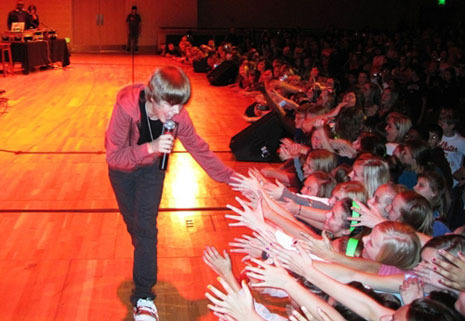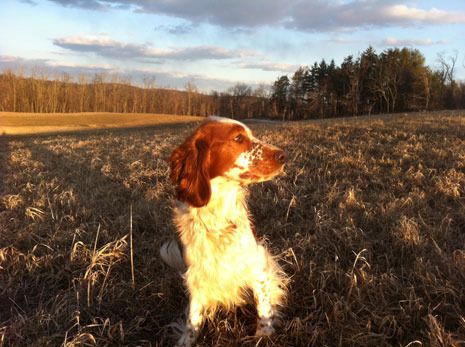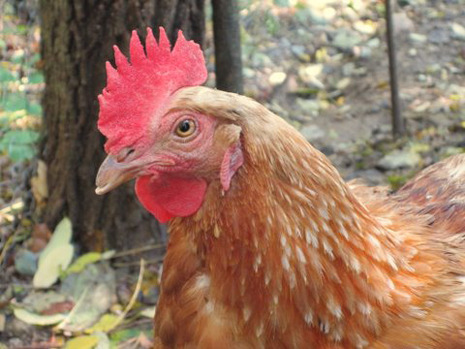Susan Orlean's Blog, page 9
May 9, 2011
Communication Fatigue
I have no idea how to get in touch with anyone anymore. Everyone, it seems, has a home phone, a cell phone, a regular e-mail account, a Facebook account, a Twitter account, and a Web site. Some of them also have a Google Voice number. There are the sentimental few who still have fax machines. If you want to be completely quaint, there are also physical mailing addresses. With this multiplicity of contact points, it seems like it should be easier than ever to get in touch, but communication has now become a snarled mess of options. Every effort to interact involves a strategic analysis of the person's habits. I want to let my friend Buster know that I would like to have dinner with him tonight. Does Buster work at home? Then how likely is he to have his cell phone on? Is he one of those people who only turns on his cell when he's in his car? I hate that. If he doesn't have his cell on all the time, does he at least check the voicemail? Or—like me—does he just scan the list of incoming calls to see who called, but never actually listen to the messages? If I call his home phone, will he answer it? Recently, I have come to assume that any call to my landline is from a telemarketer or an automated call from Terminex, letting me know that our regularly scheduled pest-extermination service will occur on its regular schedule. So I usually ignore my home phone. Before e-mail, before Twitter, before texting, I used to watch my answering machine like a hawk; now I often forget I even have an answering machine, so any message that lands there will languish for days.
Is Buster young? If so, he has a cell phone and it will always be on, but he will never answer it. The only way to raise him is by text, although a MMS is always appreciated. I could e-mail him—but wait, no; e-mail is so business-y and boring, with those insistent, demanding Subject Lines, so Buster, if he is still dewy with youth, will probably eschew e-mail. I will have to send him a message on Facebook. But does he check Facebook? If he's under thirty, yes, he checks it every two minutes. If he's over thirty, he looks at it now and again. What to do if he's, say, twenty-nine? I could tweet him—if he's following me, I can send him a private direct message. But what if he isn't? Then I have to tweet him as a public message, which means everyone else sees the machinations of our dinner plans.
I am now getting tired of Buster; tired of trying to assess Buster's social patterns; tired of the fact that instead of making one phone call and having a short, efficient conversation, I have to blast him via home phone, cell phone, text, Facebook, and Twitter to make sure to catch him somewhere. Since when was communication so exhausting?
May 5, 2011
Hero Dogs
So who was the dog that took part on the raid that killed Osama bin Laden? Like the other members of the elite SEAL team, the dog has remained anonymous; we don't even know its breed. The odds-on favorite is that it was a German shepherd; second-best guess is a Belgian Malinois, which is a type of Belgian shepherd. A teacup poodle devotee might take exception to these guesses, but hey, I'm just doing the math; these are the breeds used most often by the military.
Dogs really are perfect soldiers. They are brave and smart; they can smell through walls, see in the dark, and eat Army rations without complaint. It has been speculated that one of the most important jobs the SEAL dog might have done was to sniff the bin Laden compound for explosives and booby traps. For years, researchers have tried to engineer a device that is as sensitive as a dog's nose but haven't even come close. I actually love that such a device hasn't been invented; I love that there is something about dogs that outdoes science and can't be replicated by a machine.
Sense of smell, of course, is only one of those dog qualities that can't be replicated or improved upon. I've been researching dogs in warfare for my book about Rin Tin Tin, and I've read many accounts of their heroics: carrying messages through battle, alerting troops to enemy planes, and even parachuting behind enemy lines. The greatest feat, though, was performed by what were called "mercy dogs" in the First World War. These dogs walked among the troops on a battlefield, after the fighting had simmered down, carrying saddlebags of first-aid supplies. Wounded soldiers could call the dogs over and then help themselves whatever they needed. Those who were more gravely wounded could call the dogs over so they could embrace them and have their company while they died. A dog can do that, and would do that, with all its heart, and with tender patience. Nothing will ever be better, or more perfect, than that.
May 2, 2011
@Osamabinladen
Like many people, I learned about Osama bin Laden's death on Twitter, and then watched the President's speech and the following hours of news two-fistedly, the television remote in my left hand and my iPhone, with my Twitter feed on the screen, in my right. It was an event I wanted to experience in a group—and from the sight of the crowds at the White House and Times Square and Ground Zero, a lot of other people felt that way, too. From my house in the Hudson Valley, I was able, thanks to Twitter, to feel like I was experiencing it with people around the world.
The fact that we are able to be together even when we're not together is one of the signal changes over the last thirty years in the way we experience dramatic events. In 1981, I happened to be home in bed with the flu, wading through the usual flotsam of daytime television, when an announcer broke in and reported that Ronald Reagan had been shot. It was a shocking moment, one in which your first impulse is to bring on ballast and feel some sense of the world underneath you. I was desperate to talk to someone—anyone. But it was the sleepy, soundless middle of the day; everyone I knew was at work or out doing something, and no one at that time carried a cell phone. I sat there for at least a half-hour before I could raise someone on the phone: in the meantime, if I remember correctly, I filled the emptiness by turning on both of my televisions and the radio. It was surreal to hear such momentous news all by myself.
We don't have enough silence and privacy in the world anymore. I'm not sure we'll ever get it back, either. But much of the time, especially on occasions like this, it feels to me like a fair trade. Unlike that strange afternoon in 1981, I am grateful that last night, we were able to defy time and space, and experience something significant together.
April 28, 2011
William, Kate, and Justin Bieber

I'm not going to watch the royal wedding. It's not that I'm NOT going to watch; it's more that watching is not what I will be doing. I am not making a statement by not watching; that is, the "not" is not emphatic. I happen to love a public spectacle and I would even consider getting up early for a chance to do some royalty gawking, but to be honest, the wedding is one cultural phenomenon too many right now.
There was a time when I kept track of it all; when my mind worked like a giant lint brush being swept over the fuzzy surface of popular culture. But these days, pop culture seems to have gotten fuzzier and fuzzier; notoriety comes and goes in the snap of a finger. Every minute a new Kardashian is whelped or a meat dress is worn at a major function or a divorce of a fading athlete and a midlist actress is announced. It's a full-time job to keep track. I try, but frankly, I often fail. For instance, I was entirely blindsided by Justin Bieber. When and how did he happen? Why wasn't I informed? Did I miss it because I was distracted by everything else I was following at the time—was it, maybe, the dawn and subsequent demise of over-the-knee boots? The rehabilitation of Gretchen Mol's career? The LeBron James Decision?
For someone who can't have had a single private moment in his entire life, Prince William seems like a decent guy, even if he is prematurely balding. The girlfriend seems all right, too. And anything that can be memorialized with a snow globe, as their wedding will surely be, is clearly significant to the culture. I wish them well. If I didn't have my hands full tracking Amy Winehouse's latest drug problems, Ivanka Trump's pregnancy, and the latest news on the "Mad Men" contract talks, I would definitely tune in.
Royal Wedding
I'm not going to watch the royal wedding. It's not that I'm NOT going to watch; it's more that watching is not what I will be doing. I am not making a statement by not watching; that is, the "not" is not emphatic. I happen to love a public spectacle and I would even consider getting up early for a chance to do some royalty gawking, but to be honest, the wedding is one cultural phenomenon too many right now.
There was a time when I kept track of it all; when my mind worked like a giant lint brush being swept over the fuzzy surface of popular culture. But these days, pop culture seems to have gotten fuzzier and fuzzier; notoriety comes and goes in the snap of a finger. Every minute a new Kardashian is whelped or a meat dress is worn at a major function or a divorce of a fading athlete and a midlist actress is announced. It's a full-time job to keep track. I try, but frankly, I often fail. For instance, I was entirely blindsided by Justin Bieber. When and how did he happen? Why wasn't I informed? Did I miss it because I was distracted by everything else I was following at the time—was it, maybe, the dawn and subsequent demise of over-the-knee boots? The rehabilitation of Gretchen Mol's career? The LeBron James Decision?
For someone who can't have had a single private moment in his entire life, Prince William seems like a decent guy, even if he is prematurely balding. The girlfriend seems all right, too. And anything that can be memorialized with a snow globe, as their wedding will surely be, is clearly significant to the culture. I wish them well. If I didn't have my hands full tracking Amy Winehouse's latest drug problems, Ivanka Trump's pregnancy, and the latest news on the "Mad Men" contract talks, I would definitely tune in.
April 21, 2011
Tim Hetherington, "Restrepo," and Bravery
"Brave" is one of those words that has been bleached of most of its meaning these days, thanks to far too many appearances in the glaring light of ad slogans and corporate public relations. I never thought about anything as brave anymore; it just seemed like a flabby, glib cliché.
A few months ago, though, I saw Sebastian Junger and Tim Hetherington's documentary, "Restrepo," and, for the first time in ages, I thought about what the word really means. The film explores a year in which Junger and Hetherington were embedded with Army platoons in Afghanistan. It highlights two distinct types of bravery: the pluck of the sweet-faced soldiers who are too young and ingenuous to doubt themselves or picture their own mortality, and the nerve of Junger and Hetherington, who had made the deliberate, knowing choice to be deep inside danger. I couldn't get the movie out of my mind. I felt for the first time what a numbing terror a war really is, and how personal it is in its triumphs and losses. If you haven't seen it, be forewarned that it will break your heart.
The movie also made me think a lot about the nature of being a reporter. In a million years, I would never have the bravery to put myself in such a dire situation, and I have always felt a little ashamed that I don't have the guts to do anything close to what Junger and Hetherington have done, even when I know these are stories that need to be told. Their bravery is our gain. When I heard yesterday that Hetherington and another photographer, Chris Hondros, were killed working in Libya, I felt sick. It was a horrible reminder that bravery is a banner, but it is, unfortunately, not a shield.
April 18, 2011
Ticks

The horror of spring is upon us. Yes, the early buds are lovely, as is the first touch of sun, the warm smell of soil, the darling baby animals wet with creation, blah blah blah. But more to the point, spring carries tucked in its gentle bosom a ton of ticks, those miserable, godless, useless, deathless parasites that make the rural spring as gory and terrifying as a slasher film. My pleasure in spring is undone the minute my dog (above) comes in after a nice romp outside with twenty ticks riding piggyback. (I am not exaggerating; in fact, for the sake of not grossing out my readers, I'm using a smaller number than what we often find.)
My lowest moment occurred last week, when I was giving my son a bath and found a tick embedded in his scalp. That was the final straw: creature-lover that I am, I turned into a Valkyrie and killed the tick with mad vengeance, not just squashing it but stepping on it, cutting it in half, and flushing it down the toilet while screaming. I defy anyone to tell me what redeeming quality ticks have and what purpose they serve in the great circle of life other than to be disgusting. They have none. Everything that eats ticks could eat something else instead. They look ugly. They suck blood, which on a primal level is just wrong.
And of course they spread disease. In our household of three we've had two bouts of tick-borne Lyme disease and one of tick-borne Ehrlichiosis. If you count the dogs, we've had two additional cases of Lyme. We've had two houseguests who developed Lyme disease. (We cite them casually any time we are trying to scare away unwelcome houseguests.) There are times when I feel we are Lyme disease central, but it's not a special distinction in upstate New York; it's safe to assume that most everyone up here has Lyme disease, is recovering from it, or is about to get it. While I don't quite hold with the wild-eyed conspiracy theory about Lyme disease put forward in last year's "Under Our Skin," I am astonished that no one has done much about a disease that's so prevalent and can be, in its advanced forms, so serious.
There's not much to do about the horrible ticks except mow your meadow down (which we did) and do a monkey-style preening of other family members every night (kind of nice for the family dynamic, actually). The myth that keeping guinea fowl will rid you of ticks forever must have been a campaign started by the Guinea Fowl Industry Lobbying Group, because it's nonsense. Guinea fowl will eat whatever is in front of them, and will not bypass a worm for a tick; moreover, you'd have to have an army of guinea fowl to really have much effect. And an army of guinea fowl would drive you insane, believe me. So we keep a closet full of doxycycline, wear high white socks, and hope for the best.
Last week during that spell of warm weather there must have been a fresh hatch of ticks, because the dog and cats were festooned with them, and we found a dozen on the floor. I had to spend the night in the city, and, honestly, I was delighted; I was so creeped out by the ticks that the idea of being in an all-concrete environment for a night seemed like a treat. I was planning to sleep in my stepson's apartment. Just as I was preparing to leave, he called to tell me that I might want to consider staying somewhere else, because there had just been a confirmed case of bedbugs in his building.
I give up.
April 15, 2011
Farewell Flip

I feel sad about the demise of the Flip camcorder, but I saw it coming. I bought one of the tiny cameras right when they were released (such is the life of a gadget addict), and I was instantly smitten. About the size of a can of sardines, the Flip could record an hour of video on its internal memory, and once you downloaded that to your computer, you could start all over again. The videos looked good, and after Flip put out its high-definition version, they looked great.
I had a video camera before I got my Flip but I rarely used it—it was so clunky, the tapes were baffling and either too long or too short, and the thing was always, inevitably, out of battery power. There was no such thing as whipping it out to record a few seconds of something interesting. An entire period of my life has gone by without having been memorialized on film—if you can imagine that horror. Once I got a Flip, though, I carried it with me all the time and recorded with abandon—three seconds here, ten seconds there. It was to video recording what digital cameras were to photography, turning something expensive and requiring deliberate intent into something cheap and impulsive. I used it all the time.
But then—well, then came my cell phone, a device that long ago I used for making phone calls. My first phone only had a crummy still camera, but then I upgraded, and the cameras got better, and then, as phones—and I—kept upgrading, video was added. And then the video got much, much better. I used to gripe about devices that did too many things; it seemed that you were putting an awful lot of important stuff into one small unit which could be (as I personally can attest) stolen, left out in the rain, dropped on concrete, or lost. That meant losing not just the thing that made phone calls but all of it—the music library, the game of Bejeweled that was paused, the camera.
Still, every time I was loading up my handbag for the day, or filling a carry-on for a flight, I'd pause over my leaning tower of electronics, debating which to take, and then, more often than not, I'd move past it and pick up my iPhone and consider myself packed and ready. The Flip stayed home, and in time so did the GPS, the flashlight, the still camera, the iPod, the books, and the newspapers. It was too easy to do what was easiest—carry just one thing that could be everything, the Swiss Army knife rather than the bulging tool kit. Farewell, Flip. I wonder what will disappear next.
April 7, 2011
Spring Chickens

It's been a hard winter. Even though it's still chilly out and the sun is pale and weak, the chickens and turkeys and guinea fowl and ducks are already in a festive mood. Egg-laying has resumed. Mud is everywhere. There was so much snow around the coop this winter that the feeder, perched atop concrete blocks, got buried. During the worst of the weather, the chickens actually refused to come out of the coop. "You need some fresh air!" I'd say, poking them gently and feeling like a kindergarten teacher. If they had lips, they would have stuck out their lower ones and sulked; in any case, they did not come outside.
On the other hand, my turkeys must be pumping antifreeze through their veins. Because I spent a huge amount of time researching appropriate turkey housing, and even more time arranging to get a gigantic, somewhat unsightly turkey house for their comfort and pleasure, and because I then spent significant money having the gigantic, unsightly, much-researched turkey house set up and installed with a proper foundation, my four crazy Royal Palm toms revealed themselves to be entirely weather-tolerant and housing-intolerant, and chose to spend the entire winter, even the blackest, most bitter nights, sleeping outside on a log. Thank you, turkeys. The guinea fowl—sensing my exasperation, maybe?—decided to colonize the turkey house. Whatever. One cannot reason with either turkeys or guinea fowl. I really worried about my two ducks, Donald and Donald, because they don't belong to me—they're duck loaners from my neighbor—and I figured that if they didn't have a pond they'd go out of their minds. I set out a kiddie pool for them, but the water in it froze so solid that I couldn't even hammer it out. The ducks, even without a pond, seemed fine, although their resting state seems to me one of a busy restless anxiety, like slightly underpaid event organizers.
I lost two chickens this winter: Tookie, who was one of my original hens, the only one left of the four I got as a starter set, and Statue of Liberty, a wonderful rooster. About a year ago, I had given my sociopathic rooster Laura to a brave neighbor, who had given me Liberty in return. Both Tookie and Liberty were elderly (Tookie was nearly four, and Liberty might have been six), so the harsh winter might have simply been too much for them. All my other chicken losses in the past have been to predators, except for Chicken Orlean, who had some undiagnosable viral disease and had to be put to sleep. The ground was so hard from the cold that I couldn't even bury the birds. Sorry, Tookie and Statue of Liberty. I'm glad it's finally spring.
Photograph of Tookie: Susan Orlean.
April 1, 2011
That Palin Woman

Has any single person more indelibly colored the perception of a place than Sarah Palin has Alaska? I'm spending a few days in Anchorage, and at every turn I find myself reacting to things and people through the scrim of Palin identity. Every woman I see with a messy up-do, every snowmobile dealership I pass, every glimpse I get of a pristine wilderness waiting to be stripped and drilled reminds me of her. It's eerie. I've never felt more aware of a person hovering over a place.
Last night, I finally asked one of my dinner companions what she thought of Palin, apologizing as I asked, because I assumed it was a question that Alaskans must find wearisome, the way Los Angelenos tire of being asked about traffic. My friend looked pained, and said that there was at least an upside to the Palin fixation. Until now, she explained, many Americans from the Lower 48 treated Alaskans sort of as relics from a Living History exhibit, and usually asked whether they lived in igloos and had their own dog-sled team. At least being asked about Palin made it seem like they were recognized as part of the contemporary United States.
Photograph: Airman 1st Class Willard E. Grande.



